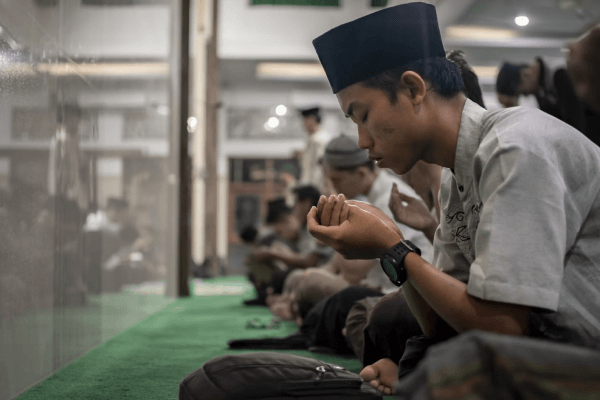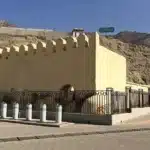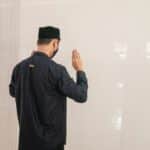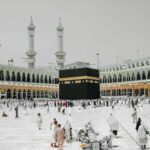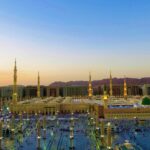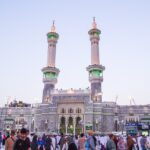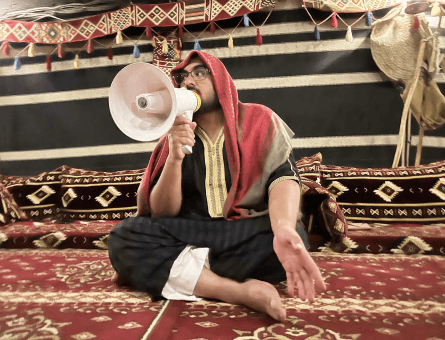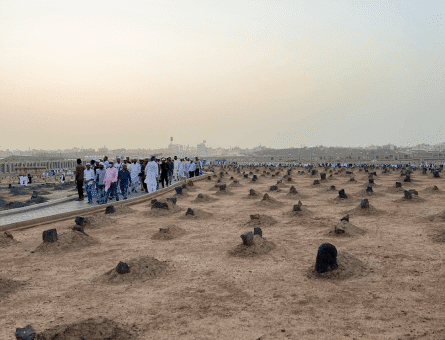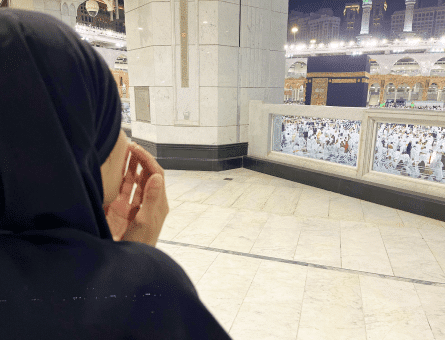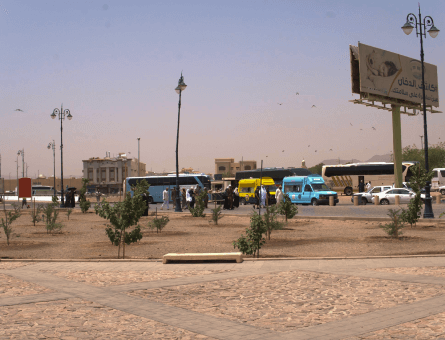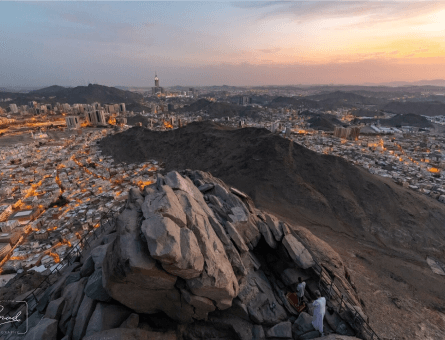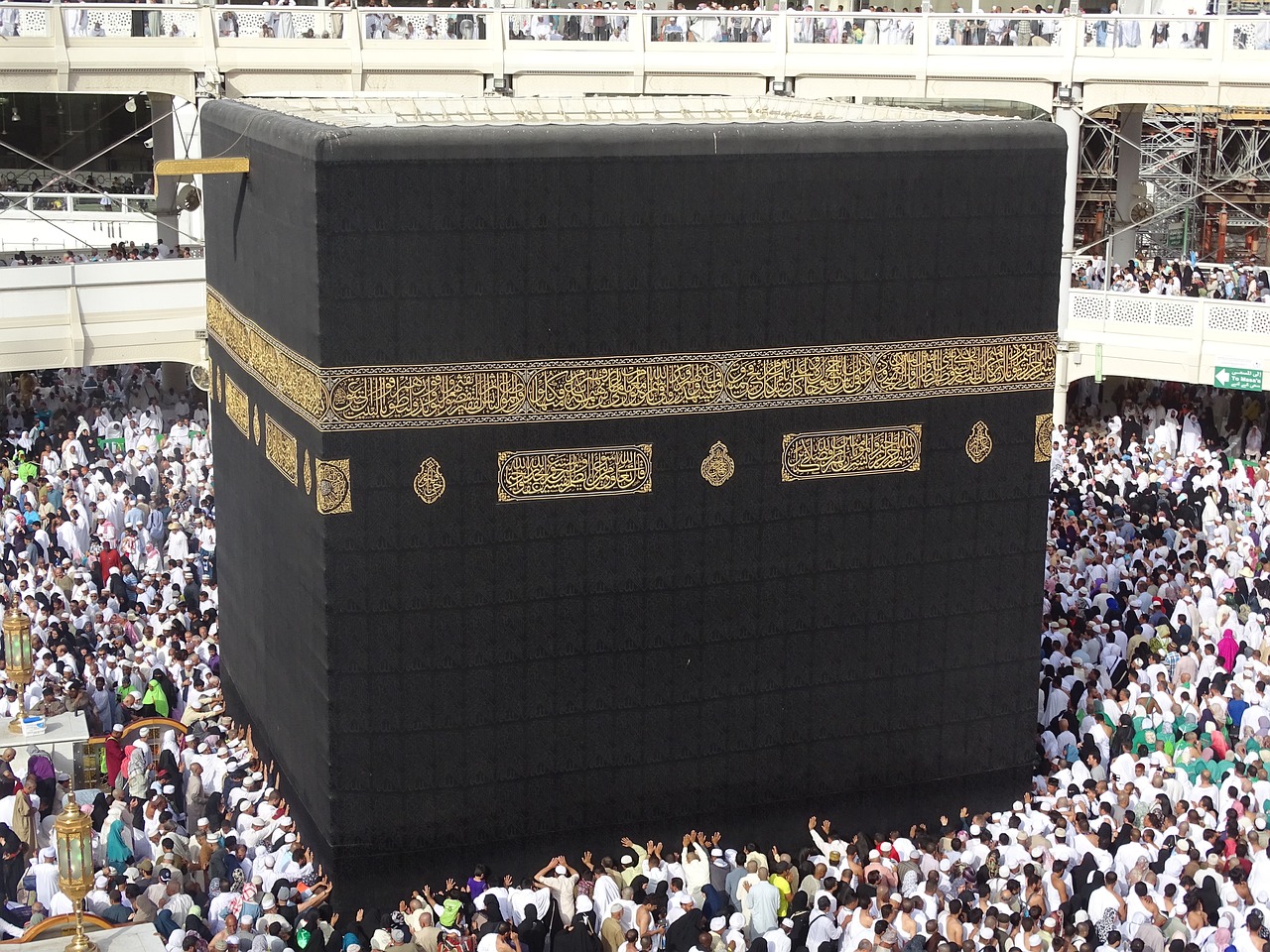Dua When First Seeing The Kaaba
In the heart of the holy city of Makkah stands an iconic structure that has been the focal point of Islamic devotion for over fourteen centuries: the majestic Holy Kaaba. A symbol of unity, spirituality, and faith for Muslims worldwide, the Kaaba is a replica of Bayt Allah (the House of Allah SWT) in Heaven.
Catching the first glimpse of the Holy Kaaba, believers turn to the timeless tradition of reciting special duas, supplications that carry their hopes, dreams, and heartfelt prayers to the Almighty.
Keep reading to learn which duas to recite upon seeing the Holy Kaaba.
What Is the Kaaba?
The Holy Kaaba, also spelt Ka’bah, is a sacred monument in the centre of Masjid al-Haram in Makkah, Saudi Arabia. Considered one of the holiest sites in Islam, the Kaaba is the direction of prayer for Muslims worldwide.
The cuboid structure of the Holy Kaaba is made from limestone and granite and measures 13.1 metres (43 feet) in height, 11.03 metres (36 feet) in width, and 12.86 metres (42 feet) in length. The Kaaba is believed to be the first house of worship ever built for the monotheistic worship of God.
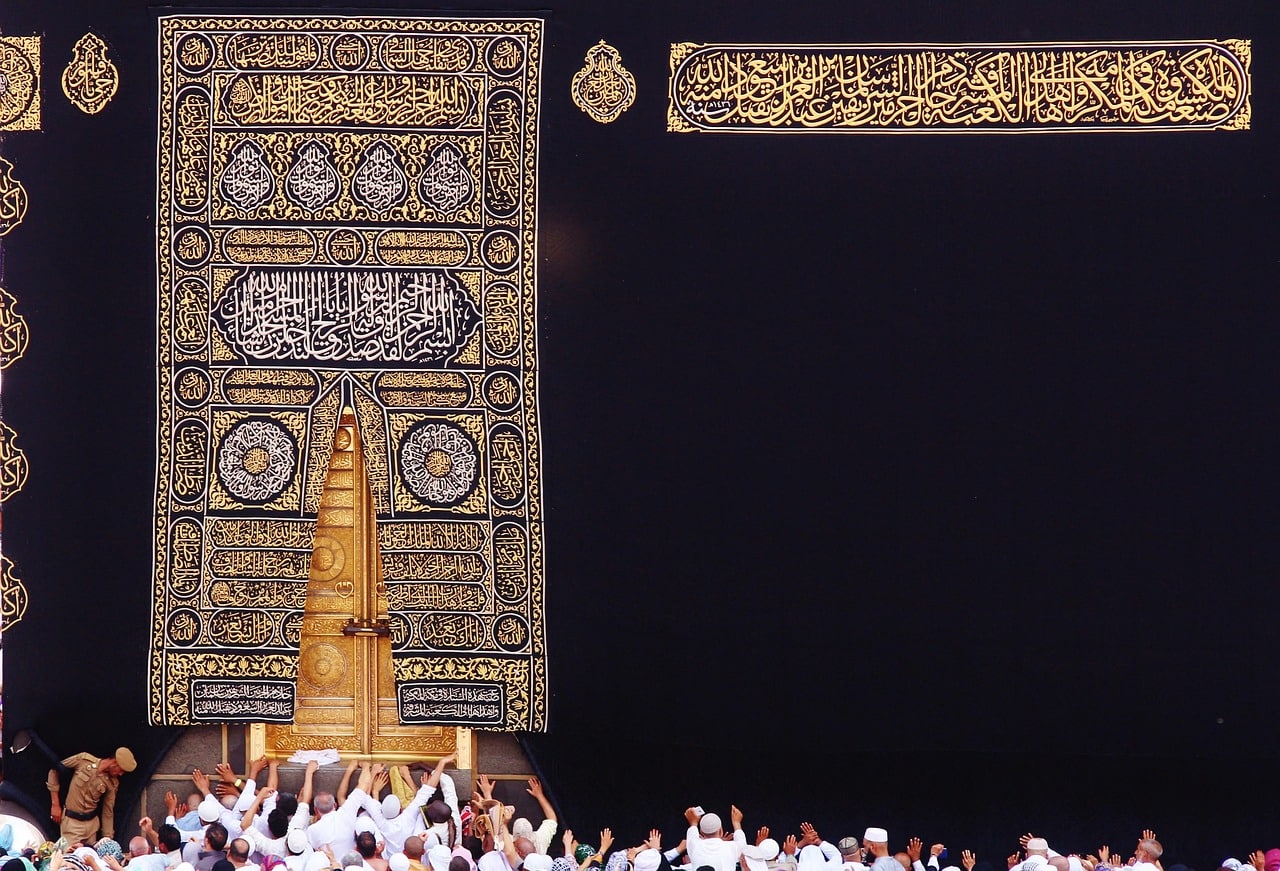
Who Was Prophet Ibrahim (AS) in Islam?
Known as Abraham in the West, Prophet Ibrahim (AS) was a beloved Messenger of Allah SWT. Born in the era of polytheism, Prophet Ibrahim (AS) went through many hardships and tests.
With a strong belief in his heart that there’s no God by one, Prophet Ibrahim (AS) stood in front of his father (Aazer) and the idol worshippers of Babylon.
On the command of Allah SWT, he left his wife (Hajar (AS)) and son (Prophet Ismail (AS)) in the middle of a desert in Makkah, leading to the miracle of Zamzam. Prophet Ibrahim (AS) was also ready to sacrifice his son for the sake of the Almighty.
Fortunately, it was only a test, as Allah SWT miraculously replaced Prophet Ismail (AS) with a sheep. Even the Holy Kaaba we see today was constructed by Prophet Ibrahim (AS) and his son Prophet Ismail (AS).
Millions of Muslims every year visit Makkah, Saudi Arabia, to perform Tawaf around the Holy Kaaba, run between the hills of Safa and Marwa, just like Hajar (AS), and commemorate the ritual of Qurbani with the same obedience and devotion that Prophet Ibrahim (AS) showed when he was asked to sacrifice his son.
Prophet Ibrahim (AS) is the forefather of Prophet Muhammad (PBUH) and has played a monumental role in shaping the religion of Islam.
What Is Tawaf?
Derived from the word “Taafa,” Tawaf literally means ‘to walk around something’ or ‘to encircle something.’ Tawaf is one of the key rituals of pilgrimage (Umrah and Hajj).
The act of circumambulating around the Holy Kaaba seven times in an anti-clockwise direction showcases devotion and spiritual love for the Almighty. Pilgrims are instructed to begin and end the Tawaf at Hajr al-Aswad.
The Messenger (PBUH) of Allah SWT has instructed the Muslim Ummah to perform Tawaf with extreme humility while remembering the greatness and power of Allah SWT and the Holy Kaaba. It is advised not to talk about worldly or unnecessary things and to avoid drinking or eating while carrying out the ritual of Tawaf.
Abdullah ibn Umar (RA) reported, “I heard the Messenger (PBUH) of Allah SWT said: ‘Whoever circles the Kaaba seven times (Tawaf) and prays two Rak’ahs will have a reward as if he has freed an enslaved person.
A man does not raise his foot and bring it back down except that ten good deeds will be written for him, ten bad deeds will be erased, and he will be raised by ten degrees.”
Dua When First Seeing the Kaaba in English
Transliteration: Allahumma zid hadha-l-Bayta tashrifan wa ta’ziman wa takriman wa mahabah, wa zid man sharrafahu wa karramahu mimman hajjahu awi- ‘tamarahu tashrifan wa takriman wa ta’ziman wa birra.
Translation: O Allah, increase this House in honour and ennoblement, reverence and awe, and increase the one who honours and ennobles it, of those who travel to it for Hajj and Umrah, in honour, reverence and piety.
Transliteration: Allahumma Antas-Salam wa minkas-salam. Tabarakta ya Dhal-jalali wal- ikram.
Translation: O Allah, You are As-Salam, From You is all peace, blessed are You O Possessor of majesty and honour.
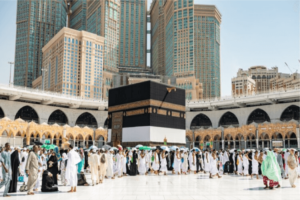
Dua When First Seeing the Kaaba in Arabic
According to Islamic scriptures, when Prophet Muhammad (PBUH) first saw the Holy Kaaba, he prayed the following dua:
الَّلهُمَّ زِدْ هّذَا البَيْتَ تَشْرِيفاً وَتَعْظِيماً وَتَكْرِيماً وَمَهَابَةً، وَزِدْ مَن شَرَّفَهُ وَكَرَّمَهُ مِمَّنْ حَجَّهُ أَو اعتَمَرَهُ تَشرِيفاً وَتَكرِيماً وَتَعظِيماً وَبِرّاً
The Messenger (PBUH) of Allah SWT also recited:
اللَّهُمَّ أَنْتَ السَّلاَمُ وَمِنْكَ السَّلاَمُ تَبَارَكْتَ يَا ذَا الْجَلاَلِ وَالإِكْرَامِ
If you don’t remember the aforementioned dua when first seeing the Kaaba, recite Allahu Akbar three times, followed by Laa illaha Illallaah (three times). Raise your hands, recite/send salawat and salam on Prophet Muhammad (PBUH), and then make the dua you want. It is said that Allah SWT grants any dua upon seeing the Holy Kaaba.
What Does It Feel Like Seeing Kaaba for the First Time?
Setting sight on the Holy Kaaba for the first time is an awe-inspiring, memorable, and beautiful experience that leaves a mark on one’s heart for a lifetime. The magnificent sight of the Holy Kaaba veiled in the dark allure of the Ghilaf, adorned with verses of the Quran gilded in radiant gold, takes one’s breath away.
The ethereal vision captivates souls, brimming eyes with tearful wonder and hearts beating in unison with the divine rhythm, making them bow before the grandeur of the Qiblah. Thus, one should use this opportunity to follow the Sunnah of reciting the dua when first seeing the Kaaba, asking for forgiveness, blessing, and mercy from Allah SWT.
Dua When Entering Makkah
If you are entering Makkah to perform Umrah, recite these supplications:
لَبَّيْكَ اللَّهُمَّ عُمْرَةً
Transliteration: Labbayk Allahumma Umrah.
Translation: O Allah, here I am to perform Umrah.
اللَّهُمَّ إِنِّيْ أُرِيْدُ الْعُمْرَةَ
Translation: Allahumma Innee Ureedul Umrah.
Transliteration: O Allah, I intend to perform Umrah.
اللَّهُمَّ إِنِّيْ أُرِيْدُ الْعُمْرَةَ فَيَسِّرْهَا لِيْ وَتَقَبَّلْهَا مِنِّ
Translation: Allahumma Innee Ureedul Umrata fa-Yassirhaa lee wa Taqabbal-haa Minnee.
Transliteration: O Allah, I intend to perform Umrah, so accept it from me and make it easy for me.
If you are visiting Makkah, Saudi Arabia, to perform Hajj, follow the Sunnah of entering the holy city while reciting the Talbiyaah:
لَبَّيْكَ اللهُمَّ لَبَّيْكَ – لَبَّيْكَ لَا شَرِيْكَ لَكَ لَبَّيْكَ – إِنَّ الْحَمْدَ وَالنِّعْمَةَ لَكَ وَالْمُلْكَ – لَا شَرِيْكَ لَكَ –
Transliteration: Labbayka llāhumma labbayk(a), labbayka lā sharīka laka labbayk(a), inna l-ḥamda wa n-ni’mata, laka wa l-mulk(a), lā sharīka lak.
Translation: At Your service, Allah, at Your service. At Your service, You have no partner, at Your service. Truly all praise, favour, and sovereignty are Yours. You have no partner.
What Do You Say When You Enter Masjid al-Haram?
Surrounding the Holy Kaaba, Masjid al-Haram is one of the most sacred sites on Earth. It is a place that only the blessed ones can visit. Thus, when given the opportunity, one should make the most of their visit to the Grand Mosque. As soon as you step within the premisses of Masjid al-Haram, recite the following supplication:
اَللَّهُـمَّ افْتَـحْ لِي أَبْوَابَ رَحْمَتـِكَ
Transliteration: Allah hu- maf tah li ab waba bi rahmatika
Translation: Oh Allah opens the doors of your mercy for me.
بسم الله والصلاة والسلام على رسول الله
رب اغفر لي ذنوبي وافتح لي أبواب رحمتك
Transliteration: Bismillah was-salatu was-salamu ‘ala Rasulillah Rabbi-ghfir li dhunubi waftah li abwaba rahmatiK
Translation: In the name of Allah, may blessings and peace be upon the Messenger of Allah. O, my Lord! Forgive me my sins and open for me the doors of Your mercy. [Tirmidhi]
While reading this dua, make sure to follow the Sunnah for keeping your right foot forward and reciting Bismillah, Durood Shareef, and Tahiyyatul Masjid.
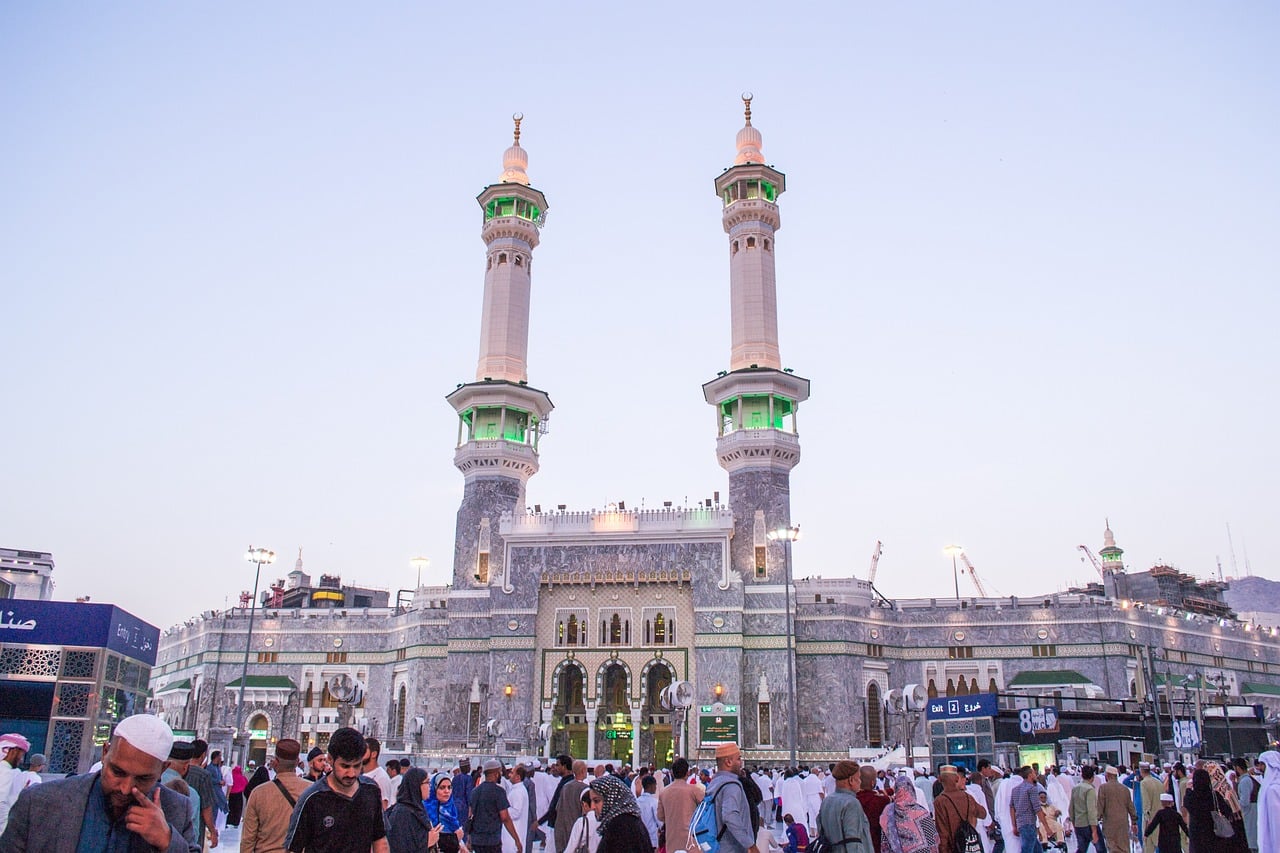
Can You Touch the Black Stone in the Kaaba?
Yes, touching or kissing the Black Stone (Hajar al-Aswad) is a voluntary act that is allowed. Jaabir ibn ‘Abd-Allah (may Allah be pleased with him) narrated that when the Messenger of Allah SWT (SAW) came to Makkah, he came to the Black Stone and touched it, then he walked to the right of it and ran three times and walked four times [around the Ka’bah].
<em>“The Hajar al-Aswad and Maqam Ibrahim are two jewels from the jewels of Paradise. Had Allah SWT not concealed their radiance, they would illuminate everything between the East and the West.”</em> (Tirmidhi)
Following in the footsteps of Prophet Muhammad (PBUH), and while kissing and touching the Black Stone, Umar (RA) said, “I know that you are only a stone which can neither bring benefit nor cause harm. Were it not that I had seen the Prophet (PBUH) kiss you, I would not have kissed you.”
Umrah Duas
رَبَّنَآ ءَاتِنَا فِي ٱلدُّنۡيَا حَسَنَةٗ وَفِي ٱلۡأٓخِرَةِ حَسَنَةٗ وَقِنَا عَذَابَ ٱلنَّارِ
Transliteration: Rabbanaaa aatina fid dunyaa hasanatanw wa fil aakhirati hasanatanw wa qinaa azaaban Naar
Translation: Our Lord! Grant us good in this world and good in the hereafter, and save us from the punishment of the Fire. [Abu Dawud: 1892, Surah Al-Baqarah: 2:201]
لَا إِلَهَ إِلاَّ اللَّهُ وَحۡدَهُ لاَ شَرِيكَ لَهُ لَهُ الۡمُلۡكُ وَلَهُ ٱلۡحَمۡدُ وَهُوَ عَلَى كَلِّ شَىۡءٍ قَدِيرٌ لَا إِلَهَ إِلاَّ اللَّهُ وَحۡدَهُ أَنۡجَزَ وَعۡدَهُ وَنَصَرَ عَبۡدَهُ وَهَزَمَ الأَحۡزَابَ وَحۡدَهُ
Transliteration: lā ạ̹laha ại̹lãạ ạllhu waḥ ۡ dahu lā sẖarĩyũka lahu lahu ạlu ۡ mul̊ ۡ k walahu ٱl ۡ ḥama ۡ d wahūa ʿalay̱ kalĩ sẖaay̱ ۡ ʾ qadīruⁿ lā ạ̹laha ại̹lãạ ạllhu waḥ ۡ dahu ạảnã ۡ jazã waʿĩ ۡ dahu wanaṣara ʿabũ ۡ dahu wahazama ạlạảḥ ۡ zāba waḥ ۡ dahu
Translation: None has the right to be worshipped except Allah, alone, without a partner. To Him belongs all sovereignty and praise, and He is over all things omnipotent. None has the right to be worshipped except Allah alone. He fulfilled His promise, aided His Servant, and single-handedly defeated the allies. [Sahih Muslim: 1218 (a)]
Summary – Dua When First Seeing the Kaaba
As we gaze upon the Holy Kaaba, we are reminded of the purpose of our lives – to submit to Allah SWT, seek His forgiveness, and walk on the path of righteousness. Reciting the dua when first seeing the Kaaba is a Sunnah that draws us closer to the essence of our faith, leaving an indelible mark on our hearts.
Make the most of this life-changing opportunity by asking Allah SWT for His mercy and blessings in this life and the Hereafter
Through His Names
New course with
Ustadh Shabbir Hassan




